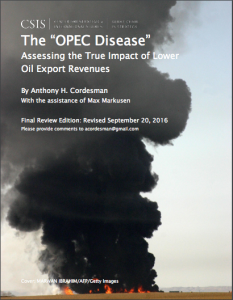Full Title: The “OPEC Disease”: Assessing the Impact of Lower Oil Export Revenues
Author(s): Anthony H. Cordesman with the assistance of Max Markusen
Publisher(s): Center for Strategic and International Studies
Publication Date: September 1, 2016
Full Text: Download Resource
Description (excerpt):
The Organization of Petroleum Exporting States (OPEC) is sometimes seen as a group of wealthy oil states capable of controlling world petroleum supplies and prices for its own benefit. It has become all too clear over the last few years, however, that OPEC cannot control supply, and its members have deeply divided and conflicting economic and security interests.
OPEC cannot act as a cartel, and faces serious problems in in acting in any coordinated way in a world that is not driven by high economic growth and demand for energy, and where many new forms of petroleum and other energy supplies compete with OPEC production.
At the same time, an analysis of OPEC governments and economies reveals that most are effectively failed states that are anything but wealthy. With the exception of a few Arab Gulf states, notably Qatar and the UAE, most have used their petroleum income to distort their economies in ways that benefit only a small portion of their population and that serious distort their economies and social structures.
By comparison the “Dutch disease”—the negative impact on an economy of a sharp inflow of foreign currency from the sudden discovery and production of large oil or gas reserves that makes the country’s other products less competitive on the export market—is far more limited. The “OPEC disease” has led most members of OPEC to seriously distort their entire economies over a period of decades, grossly over-rely on government use of petroleum export income, and enrich a small elite at the cost of massive corruption and unequal distribution of income.
The crash in oil prices and export revenues from 2014 through 2016 has exposed just how pervasive and critical this “disease” is in most of OPEC. Moreover, only one members of OPEC with a large native population—Saudi Arabia—has so far reacted with a major reform program, and Saudi Arabia has already begun to react before the crisis with countercyclical budget and by a major effort to meet needs if its people following the beginning of the political upheaval in the Middle East in 2011.
The rest of OPEC has poor to failed governance and economic development and consists of “failed states.” This is clear from IMF, World Bank, and CIA reporting on their politics, governance, and economies. It is also clear from U.S. State Department reporting on their treatment of human rights.
